- Home
- Charles L. Grant
The Pet
The Pet Read online
THE PET
By Charles L. Grant
Digital Edition published by Crossroad Press
Copyright 2012 / The Estate of Charles L. Grant
Copy-edited by: Kurt M. Criscione
Cover design by: David Dodd
Cover image courtesy of:
http://peachesrox-stock.deviantart.com/
LICENSE NOTES
This eBook is licensed for your personal enjoyment only. This eBook may not be re-sold or given away to other people. If you would like to share this book with another person, please purchase an additional copy for each person you share it with. If you're reading this book and did not purchase it, or it was not purchased for your use only, then you should return to the vendor of your choice and purchase your own copy. Thank you for respecting the hard work of this author.
Meet the Author
Photo by Jeff Schalles
Charles L. Grant taught English and history at the high school level before becoming a full-time writer in the '70s. He served for many years as an officer in the Horror Writers Association and in Science Fiction Writers of America.
He was known for his "quiet horror" and for editing the award-winning Shadows anthologies. He received the British Fantasy Society's Special Award in 1987 for life achievement; in 2000, he was the recipient of the Lifetime Achievement Award from HWA. Other awards include two Nebula Awards and three World Fantasy Awards for writing and editing.
Charlie died from a lengthy illness on September 15, 2006, just three days after his birthday. He lived in Newton, NJ, and was married to writer/editor Kathryn Ptacek for nearly twenty-five years.
Book List
Horror
Novels
Black Oak: Genesis
Black Oak: The Hush of Dark Wings
Black Oak: Winter Knight
Black Oak: Hunting Ground
Black Oak: When the Cold Wind Blows
Fire Mask
For Fear of the Night
In A Dark Dream
Jackals
Millennium Quartet #1: Symphony
Millennium Quartet #2: In the Mood
Millennium Quartet #3: Chariot
Millennium Quartet #4: Riders in the Sky
Night Songs
Raven
Something Stirs
Stunts
The Bloodwind
The Curse
The Grave
The Hour of the Oxrun Dead
The Last Call of Mourning
The Nestling
The Pet
The Sound Of Midnight
The Tea Party
The Universe of Horror Trilogy
The Soft Whisper of the Dead
The Dark Cry of the Moon
The Long Night of the Grave
Collections
Dialing the Wind
Nightmare Seasons
The Black Carousel
The Orchard
Science Fiction
A Quiet Night of Fear
Ascension
Legion
Ravens of the Moon
The Shadow of Alpha
As "Geoffrey Marsh"
The Fangs of the Hooded Demon
The King of Satan's Eyes
The Patch of the Odin Soldier
The Tail of the Arabian, Knight
As "Lionel Fenn"
The Quest for the White Duck Trilogy
Blood River Down
Web of Defeat
Agnes Day
668, the Neighbor of the Beast
By The Time I Get To Nashville
Mark of the Moderately Vicious Vampire
Once Upon a Time in the East
The Once and Future Thing
The Really Ugly Thing From Mar
The Reasonably Invisible Man
The Seven Spears of the W'dch'ck
Time, the Semi-Final Frontier
As "Simon Lake"
Daughter of Darkness
Death Cycle
Death Scream
He Told Me To
Shapes Berkley
Something's Watching
The Clown
The Forever House
As "Felicia Andrews"
Moonwitch
Mountainwitch
Riverrun
Riverwitch
Seacliffe
Silver Huntress
The Velvet Hart
As "Deborah Lewis"
Eve of the Hound
Kirkwood Fires
The Wind at Winter's End
Voices Out of Time
DISCOVER CROSSROAD PRESS
Visit our online store
Subscribe to our Newsletter
Visit our DIGITAL and AUDIO book blogs for updates and news.
Connect with us on Facebook
For Kathryn. Because.
Chapter One
A cool night in late September, a Wednesday, and clear—the moon pocked with grey shadows, and a scattering of stars too bright to be masked by the lights scattered below; the chilled breath of a faint wind that gusted now and then, carrying echoes of night sounds born in the trees, pushing dead leaves in the gutters, rolling acorns in the eaves, snapping hands and faces with a grim promise of winter.
A cool night in late September, a Wednesday, and dark.
... and so the boy, who really wasn't a bad kid but nobody really knew that because of all the things he had done, he looked up in the tree ...
And from the Hudson River to a point midway across New Jersey, the land climbed in easy steps toward the Appalachian chain. The forests were gone and so were most of the pastures, replaced by communities that grew in quick time into small towns and small cities, pieces of a jigsaw fit too close together.
One piece was Ashford, a piece not the largest, settled on the first of those low curving plateaus, its drop facing south, low hills at its back. From the air it was indistinguishable from any of its neighbors just a concentration of lights, glints on the edge of a long ebony razor.
... and he saw the crow sitting on the highest branch in the biggest tree in the world. A big crow. The biggest crow he had ever seen in his life. And the boy knew, he really and truly knew, that the crow was going to be the only friend he had left in the world. So he talked to the crow and he said ...
The park was in the exact center of town, five blocks deep and three long blocks wide, surrounded by a four-foot stone wall with a concrete cap worn down in places by the people who sat there to watch the traffic go by. At the north end was a small playing field with a portable bandstand erected now behind home plate, illuminated by a half-dozen spotlights aimed at it from the sides; and the folding chairs, the lawn chairs, the tartan blankets and light autumn jackets covered the infield, protecting the large audience from the dust of the base paths and the spiked dying grass slowly fading to brown.
A student-painted banner fluttered and billowed over the handstand's domed peak, unreadable now that twilight had gone, but everyone knew it proclaimed with some flair the approach of Ashford Day in just over a month. The concert was a free preview of the events scheduled for the week-long celebration-a century-and-a-half and still going strong.
The high school band members sat on their chairs, wore their red uniforms with the black and gold piping, and played as if they were auditioning to lead the Rose Bowl parade. They slipped through "Bolero" as if they knew what it meant, marched through Sousa as if they'd met him in person, and they put fireworks and rockets, Catherine wheels and Roman candles exploding and spinning into the audience's imagination, into the dark autumn sky, when they bellowed and strutted through the "1812 Overture."
At the rim of the field, back in the bushes where the lights didn't reach, there were a few giggles, a few slaps, more than a few cans of beer popp
ing open.
... do you think it'll be all right?
The parents, all the relatives, the school board, and the mayor applauded as if they'd never heard anything quite so grand in their lives.
The bandmaster beamed, and the band took a bow. There were no encores planned, but the applause continued just the same.
... and the crow said, it'll be just fine as long as you know who your friends really are.
In the middle of the park was an oval pond twenty feet wide, with a concrete apron that slanted down toward the water. It wasn't very deep; a two-year-old child could wade safely across it, but it reflected enough of the sun, enough of the sky, more than enough of the surrounding foliage to make it seem as if the depths of an ocean were captured below the surface. Around it were redwood benches bolted to the apron's outer rim. Above them were globes of pale white atop six bronze pillars gone green with age and weather. Their light was soft, falling in soft cowls over the quiet cold water, over the benches, over the eleven silent children who were sitting on them now. They didn't listen to the music, though it was audible through the trees; they ignored applause that sounded like gunshots in the distance; instead, they listened to the young man in pressed black denim who crouched at the apron's lip, back to the pond, hands clasped between his knees.
His voice was low, rasping, his eyes narrowed as he sought to draw the children deeper into the story.
"And so the boy said, how do I know who my real friends are? Everyone hates me; they think I'm some kind of terrible monster. And the crow, he laughed like a crazy man and said, you'll know them when you see them.
The boy was a little afraid. Am I a monster, he asked after a while, and the crow didn't answer. Are you one of my friends, the little boy asked?
Of course I am, said the crow. In fact, I'm your best friend in the whole wide world."
The children stirred as the applause faded, and they could hear the first of the grown-ups drifting down the central path. The young man frowned briefly. He thought he had planned the story better, to end just as the band did, but he had gotten too carried away, elaborating and posturing to get the kids laughing so they wouldn't be bored. Now he had lost them. He could see it in their eyes, in the shifting on the benches, in the way their heads turned slightly, too polite to ignore him outright though their gazes were drawn to the blacktopped walk that came out of the dark on its way to the south exit.
"Crows don't talk," one ski-capped boy suddenly declared with a know-it-all smile as he slipped off his seat.
"Sure they do," a girl in a puffy jacket argued.
"Oh, yeah? You ever hear one, smarty?"
"Bet you never even saw one, Cheryl," another boy said. "I'll bet you don't even know what they look like."
The girl turned, hands outstretched. "Donald, I do so know what one looks like."
The others were lost now, noisily lining up as if choosing sides for a game. The crow's supporters were outnumbered, but they made up for it with indignant gestures and shrill protests, while the mocking opposition-mostly boys, mostly the older ones-sneered knowingly and laughed and punched each other's arms.
"Everyone knows what a crow looks like," Don said, in such a harshly quiet way that they all turned to look. "And everyone knows what the biggest crow in the world looks like, right?"
A few heads instantly nodded. The rest were unconvinced.
Don smiled as evilly as he could, and stood, and pointed to the nearest tree, directly behind them. Most of them looked with him; the others, sensing a trick and not wanting to give him the satisfaction, resisted.
Until the little girl put a hand to her mouth, and gasped.
"That's right." He kept pointing. "See? Right there, just out of the light? Look real hard now. Real hard and you won't miss it. You can see his feathers kind of all black and shiny. And his beak, right there by that leaf, it's sort of gold and pointed like a dagger, right?"
The little girl nodded slowly. No one else moved.
"And his eyes! Look at them, they're red. If you look real hard-but don't say anything or you'll scare him away-you can see one just over there. See it? That little bit of red up in the air? It looks like blood, doesn't it? Like a raindrop of blood hanging up there in the air."
They stared.
They backed away.
It was quiet in the park now, except for the leaves.
"Aw, you're fulla crap," the ski-capped boy said, and walked off in a hurry, just in time to greet his parents strolling down from the concert. He laughed and hugged them tightly, and Don without moving seemed to stand to one side while the children broke apart and the oval filled with voices, with feet, with faces he knew that thanked him for watching the little ones who would have been bored stiff listening to the music, and it was certainly cheaper than hiring a sitter.
He slipped his hands into his jeans pockets and rolled his shoulder under the black denim jacket and grey sweatshirt.
His light brown hair fell in strands over his forehead, curled back of his ears, curled up at the nape. He was slender, not tall, his face almost but not quite touched by a line here and there that made him appear somewhat older than he was.
Within moments the parents and their children were gone.
"Hey, Boyd, playing Story Hour again?"
He looked across the pond and grinned self-consciously. Three boys walked around the pond toward him, grinned back, and roughed him a bit when they joined him, then pushed him in their midst and herded him laughing toward the bike stand just inside the south gate.
"You should've been there, Donny," Fleet Robinson told him, leaning close with a freckled hand on Don's arm. "Chris Snowden was there." He rolled his eyes heavenward as the other boys whistled. "God, how she can see that keyboard with those gazongas is a miracle."
"Hey, you'd better not say stuff like that in front of Donny the Duck," said Brian Pratt solemnly. Then he winked broadly, and not kindly. "You know he doesn't believe in that kind of talk. It's sexist, don't you guys know that? It's demeaning to the broads who jerk him off on the porch."
"Drop dead, Brian," Don said quietly.
Pratt ignored him. With a sharp slap to Robinson's side he jumped ahead of the others and walked arrogantly backward, his cut-off T-shirt and soccer shorts both an electric red and defiant of the night's early autumn chill. "But if you want to talk about gazongas, you crude bastards, if you're really gonna get down in the gutter, then let me tell you about Trace tonight. Christ! I mean, you want to talk excellent development? Jesus, I could smother, you know what I mean? And she was waiting for it, just waiting for it, y'know? I mean, you could see it in her eyes! Christ, she was fucking asking for it right there on the stage! Oh, my god, I wish to hell her old man wasn't there, he should've been on duty or something. Soon as she put down that stupid flute I'd've planked her so damned fast ... oh god, I think I'm dying!"
Robinson's hand tightened when he felt the muscle beneath it tense.
"Don't listen to him, Don. In the first place, Tracey hasn't talked to him since the first day of kindergarten except to tell him to get the hell out of her way, and in the second place, he don't know nothing he don't see in a magazine."
"Magazine, shit," scoffed Jeff Lichter. "The man can't even read, for god's sake."
"Read?" Pratt said, wide-eyed. "What the hell's that?"
"Reading," explained Tar Boston, "is what you do when you open a book."
He paused and put his hands on his hips. "You remember books, Brian. They're those things you got growing mold on in your locker."
Pratt sneered and lifted his middle finger. Robinson and Boston, both heavy set and both wearing football jackets over light sweaters, took off after him, hollering, wind-milling their arms as though they were plummeting down a hill.
Ahead was the south gate, and beyond it the lights of Parkside Boulevard.
Jeff stayed behind. He was the shortest of the group, and the only one wearing glasses, his brown hair reaching almost to his shoulders. "Nice
guys."
Don shrugged. "Okay, I guess."
They walked from dark to light to dark again as the lampposts marked the edge of the pathway. Jeffs tapped heels smacked on the pavement; Don's sneakers sounded solid, as if they were made of hard rubber.
"How'd you get stuck with that?" Lichter asked with a jerk of his thumb over his shoulder.
"What, the story stuff?"
"Yeah."
"I didn't get stuck with it. Mrs. Klass asked me if I'd watch Cheryl for a while. Said she'd give me a couple of bucks to keep her out of her hair. Next thing I knew I had a gang."
"Yeah, story of your life, I think."
Don looked but saw nothing on his friend's face to indicate sarcasm, or pity.
"She pay you?"
"I'll get it tomorrow, at school."
"Like I said—story of your life."
At the bike stand they paused, staring through the high stone pillars to the empty street beyond. Pratt and the others were gone, and there was little traffic left to break the park's silence.
"That creep got away with another one, you know," Jeff said then, looking nervously back over his shoulder at the trees. "The Howler, I mean."
"I heard." He didn't want to talk about it. He didn't want to talk about some nut over in New York who went around tearing up kids with his bare hands and howling like a wolf when he was done. Five or six by now, he thought; once a month since last spring, and now it was five or six dead. And the worst part was, nobody even knew what he looked like. He could be an old man, or a woman who hates kids, or ... or even a kid.
"Well, if he comes here," Lichter said, glaring menacingly at the shadows, his hair wind-fanned over his eyes, "I'll kick his balls right up to his teeth. Or get Tracey's old man to arrest him for unlawful mutilation."

![[Oxrun Station] The Orchard Read online](http://i1.bookreadfree.com/i/03/17/oxrun_station_the_orchard_preview.jpg) [Oxrun Station] The Orchard
[Oxrun Station] The Orchard![Riders in the Sky - [Millennium Quartet 04] Read online](http://i1.bookreadfree.com/i/03/20/riders_in_the_sky_-_millennium_quartet_04_preview.jpg) Riders in the Sky - [Millennium Quartet 04]
Riders in the Sky - [Millennium Quartet 04]![Chariot - [Millennium Quartet 03] Read online](http://i1.bookreadfree.com/i/03/19/chariot_-_millennium_quartet_03_preview.jpg) Chariot - [Millennium Quartet 03]
Chariot - [Millennium Quartet 03]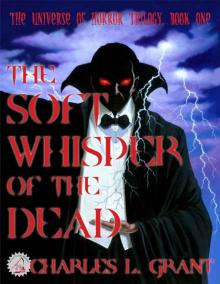 The Universe of Horror Volume 1: The Soft Whisper of the Dead (Neccon Classic Horror)
The Universe of Horror Volume 1: The Soft Whisper of the Dead (Neccon Classic Horror)![[Oxrun Station] Dialing The Wind Read online](http://i1.bookreadfree.com/i/03/19/oxrun_station_dialing_the_wind_preview.jpg) [Oxrun Station] Dialing The Wind
[Oxrun Station] Dialing The Wind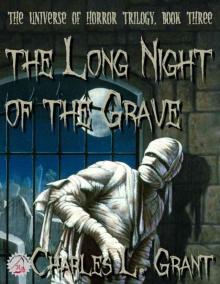 The Universe of Horror Volume 3: The Long Night of the Grave (Neccon Classic Horror)
The Universe of Horror Volume 3: The Long Night of the Grave (Neccon Classic Horror)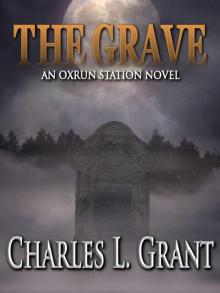 The Grave - An Oxrun Station Novel (Oxrun Station Novels)
The Grave - An Oxrun Station Novel (Oxrun Station Novels)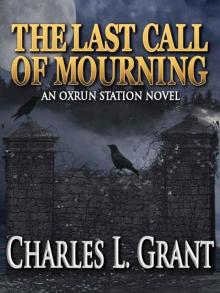 The Last Call of Mourning - An Oxrun Station Novel (Oxrun Station Novels)
The Last Call of Mourning - An Oxrun Station Novel (Oxrun Station Novels)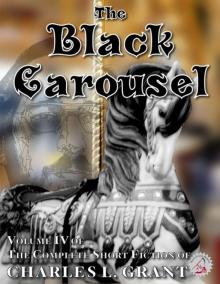 The Complete Short Fiction of Charles L. Grant, Volume IV: The Black Carousel
The Complete Short Fiction of Charles L. Grant, Volume IV: The Black Carousel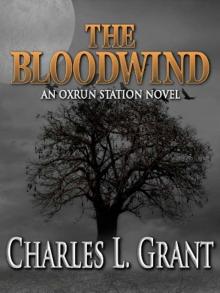 The Bloodwind - An Oxrun Station Novel (Oxrun Station Novels)
The Bloodwind - An Oxrun Station Novel (Oxrun Station Novels)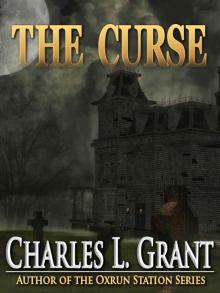 The Curse
The Curse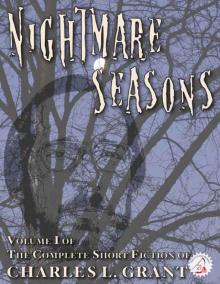 The Complete Short Fiction of Charles L. Grant Volume 1: Nightmare Seasons (Necon Classic Horror)
The Complete Short Fiction of Charles L. Grant Volume 1: Nightmare Seasons (Necon Classic Horror)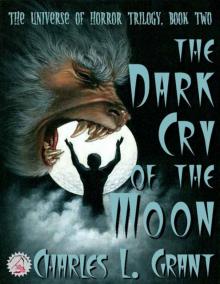 The Universe of Horror Volume 2: The Dark Cry of the Moon (Neccon Classic Horror)
The Universe of Horror Volume 2: The Dark Cry of the Moon (Neccon Classic Horror)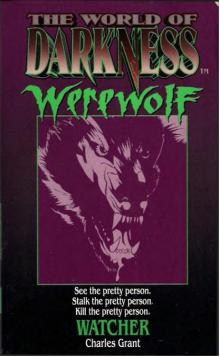 Watcher: Based on the Apocalypse (World of Darkness : Werewolf)
Watcher: Based on the Apocalypse (World of Darkness : Werewolf)![[Oxrun Station] The Bloodwind Read online](http://i1.bookreadfree.com/i/03/25/oxrun_station_the_bloodwind_preview.jpg) [Oxrun Station] The Bloodwind
[Oxrun Station] The Bloodwind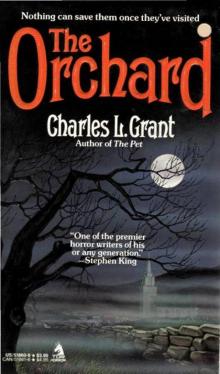 The Orchard
The Orchard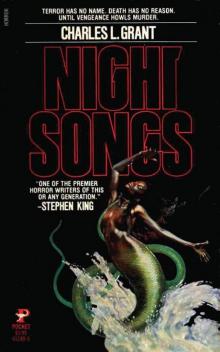 Night Songs
Night Songs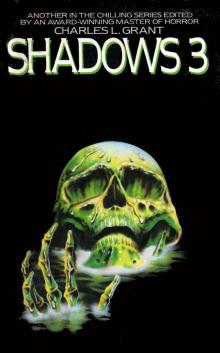 Shadows 3
Shadows 3![Symphony - [Millennium Quartet 01] Read online](http://i1.bookreadfree.com/i1/04/02/symphony_-_millennium_quartet_01_preview.jpg) Symphony - [Millennium Quartet 01]
Symphony - [Millennium Quartet 01]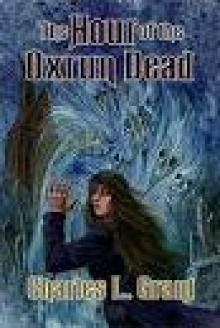 The Hour of the Oxrun Dead (Necon Classic Horror)
The Hour of the Oxrun Dead (Necon Classic Horror)![In the Mood - [Millennium Quartet 02] Read online](http://i1.bookreadfree.com/i1/03/31/in_the_mood_-_millennium_quartet_02_preview.jpg) In the Mood - [Millennium Quartet 02]
In the Mood - [Millennium Quartet 02]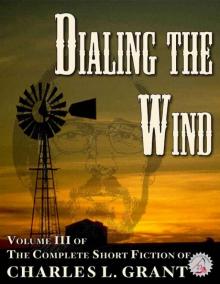 The Complete Short Fiction of Charles L. Grant Volume 3: Dialing the Wind (Neccon Classic Horror)
The Complete Short Fiction of Charles L. Grant Volume 3: Dialing the Wind (Neccon Classic Horror)![[Oxrun Station] The Last Call of Mourning Read online](http://i1.bookreadfree.com/i2/04/05/oxrun_station_the_last_call_of_mourning_preview.jpg) [Oxrun Station] The Last Call of Mourning
[Oxrun Station] The Last Call of Mourning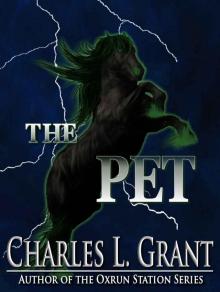 The Pet
The Pet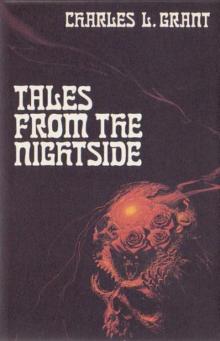 Tales from the Nightside
Tales from the Nightside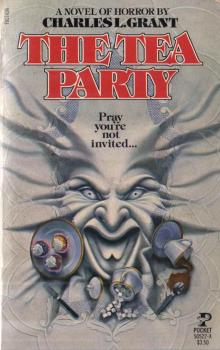 The Tea Party - A Novel of Horror
The Tea Party - A Novel of Horror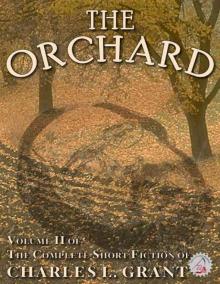 The Complete Short Fiction of Charles L. Grant Volume 2: The Orchard (Necon Classic Horror)
The Complete Short Fiction of Charles L. Grant Volume 2: The Orchard (Necon Classic Horror) Whirlwind
Whirlwind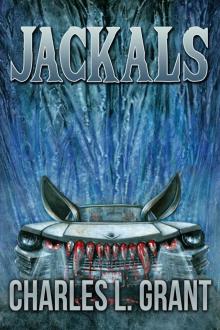 Jackals
Jackals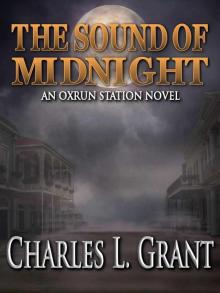 The Sound of Midnight - An Oxrun Station Novel
The Sound of Midnight - An Oxrun Station Novel